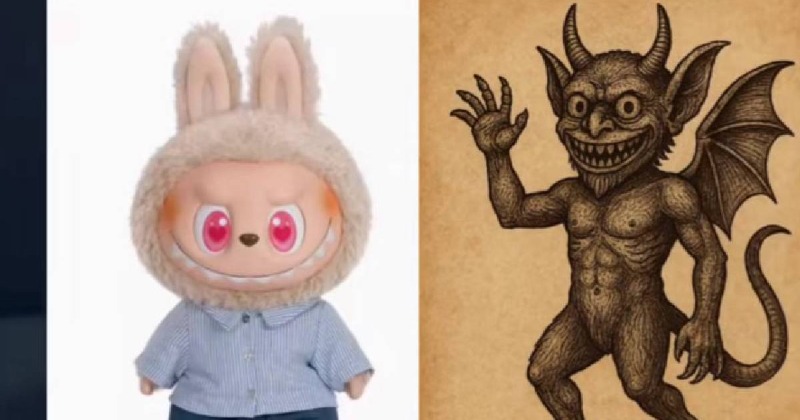A viral storm of internet speculation has transformed a line of collectible dolls into the subject of mass unease. Labubu, a furry, mischievous-looking toy designed by Hong Kong-based artist Kasing Lung and marketed by the Chinese company Pop Mart, is now at the center of bizarre claims linking it to Pazuzu, the Mesopotamian demon of winds and pestilence.
From TikTok montages to Instagram reels and Reddit threads, social media has given rise to a modern-day folk panic, asserting—without evidence—that the popular doll may be “possessed” or cursed. Some posts go as far as suggesting behavioral changes in children and paranormal experiences among collectors.
A Demon in Disguise?
At the heart of the controversy is a supposed visual resemblance between Labubu and Pazuzu—a demon featured prominently in Mesopotamian mythology and popularized in The Exorcist franchise. Online theorists have pointed to the doll’s exaggerated grin and large eyes as being “eerily similar” to ancient depictions of the demon, despite clear artistic and cultural differences.
In reality, Pazuzu, often portrayed with a grotesque face, wings, and hybrid animal limbs, has no direct connection to the soft, playful form of Labubu. Scholars of religion and ancient art have widely dismissed the claim, calling it “a textbook example of internet-driven misinformation.”
A Harmless Toy, a Dangerous Myth
Kasing Lung, the creator of Labubu, has previously described the character as a “forest spirit” born of Nordic folklore and fantasy art. The toys have been around since 2015 and saw a commercial surge after Pop Mart introduced them in blind-box form in 2019. Since then, they have become a global phenomenon, with limited editions reselling for hundreds of dollars on the secondary market.
Psychologists and cultural critics have also weighed in, stating that the panic reflects a classic moral scare, similar to past episodes involving Ouija boards, Furby dolls, or Pokémon cards. “Children forming deep emotional attachments to toys is normal,” said one clinical child psychologist. “What we’re seeing now is adults projecting superstition onto innocent objects.”
A Commercial Boom Amid the Controversy
Ironically, the demonic allegations have only heightened Labubu’s popularity. Pop Mart reported over $400 million in Labubu sales last year, making it one of the company’s most lucrative characters. The controversy has fueled demand, with toy collectors scrambling to get their hands on limited editions and online listings reaching record prices.
Retailers in parts of Russia, Iraq’s Kurdistan region, and a few Southeast Asian countries have reportedly paused sales in response to parental complaints, though no official bans or findings support the claims of harm.
Internet Folklore in the Age of Virality
| Issue | Status |
|---|---|
| Alleged link to Pazuzu | Debunked by experts; based on loose visual parallels |
| Creator’s intent | Inspired by folklore; no occult or religious basis |
| Health/safety risk | None established; panic driven by online speculation |
| Market response | Spike in sales and collector interest |
While many view the Labubu panic as a fleeting trend, it offers a deeper lesson in how digital misinformation and cultural superstition can intersect to rewrite the narrative of even the most benign products. As online content creators continue to sensationalize the doll’s appearance, one truth remains grounded: Labubu is not a demon—it’s a doll.


